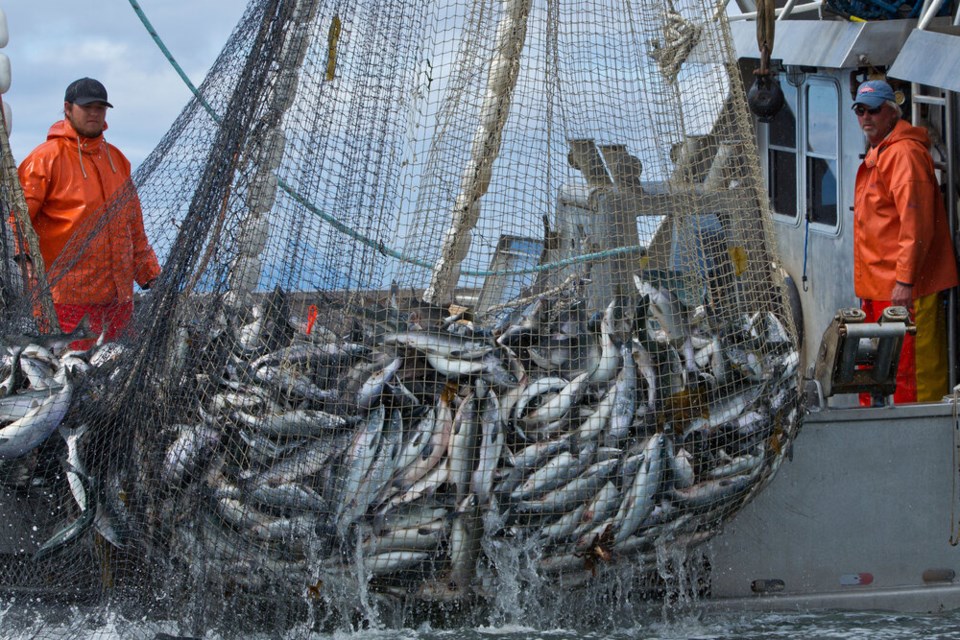Two B.C. conservation groups have filed a notice of objection to the the world’s premier sustainable fisheries body calling on it to reject the re-certification of Alaska’s salmon fisheries as "sustainable" on grounds it continues to intercept at-risk salmon populations bound for B.C., Washington and Oregon.
SkeenaWild Conservation Trust and Raincoast Conservation Foundation submitted the notice to the U.K.-based Marine Stewardship Council (MSC) April 16. They target two districts in the waters of southeast Alaska, where the submission says boats have deployed nets to corral schools of fish and indiscriminately scoop up a number of non-target species, including steelhead, chinook and sockeye salmon.
The Marine Stewardship Council first certified the Alaskan fisheries as sustainable in 2000. Unless it’s renewed, that certification will expire in 2024.
SkeenaWild’s executive director Greg Knox estimates about three million B.C. salmon are intercepted in the southeast corner of Alaska every year.
“We believe they're intercepting more salmon than we're catching in all of our fisheries in British Columbia,” Knox said.
Seen by many as the global “gold standard” of sustainable fish, Knox says that by allowing Alaskan interceptions of B.C.-bound fish, it is essentially hoodwinking consumers around the world.
“It’s really a case of eco-fraud, where they're putting up little blue sustainability label, the Marine Stewardship Council label, on packages to try to misrepresent to consumers the sustainability of the fish they're buying,” said Knox.
Misty MacDuffee, the wild salmon program director at Raincoast Conservation Foundation, said that while targeting Alaskan fisheries, her organization also continues to put pressure on the interception of salmon in B.C. waters.
In 2019, the group holding MSC certificates for B.C. sockeye, pink and chum voluntarily dropped out of the program, citing a lack of commitment from federal fisheries managers. MacDuffee said focusing on Alaska wasn’t about giving B.C. a pass, but making sure consumers weren’t duped.
“If someone says, ‘Fine, give them the blue check mark’ and nobody questions that, that’s a problem,” she said.
Alaska continues fishing despite threat to killer whales
The two groups claim that MRAG Americas, the company assessing whether Alaska’s fishery is sustainable, has not carried out due diligence in its description of how the fishery operates.
They allege the company “significantly underestimates” how many salmon are being killed as they pass through Alaska on their way to rivers spanning the Skeena and Nass in B.C.’s north to the Columbia River on the Washington-Oregon border.
The submissions also point to a U.S. court decision that found more than 90 per cent of the chinook salmon caught in Alaska is not from there. In May 2023, a U.S. federal judge threw out a key authorization that has allowed for those interceptions, finding government plans to protect salmon from fishing were too vague and contributed to starving the southern resident killer whale population in violation of the U.S. Endangered Species Act.
The State of Alaska has since appealed that ruling in a case that is set to be heard in the coming months. In the meantime, the southeast Alaskan fishery has been allowed to go ahead this year over fears it would have a massive economic impact on people who rely on the catches.
“They’ve been allowed to continue fishing while they figure that out,” Knox said. “They've allowed them to keep essentially overfishing endangered populations and southern resident killer whale food.”
An independent adjudicator will assess the merits of the notice of objection within 15 days of the submissions. If accepted, Alaska and the two NGOs will both have a chance to present evidence and argue their case.
‘Our fisheries are sustainably managed’
Matt Donohoe, fisherman and president of the Alaska Trollers Association, said he was confused why fisherman in his part of the industry were being targeted.
“It’s really dumbfounding that such a small group of people are taking heat,” he said. “They give MSC certifications to the factory boats in the Bering Sea, but they don’t seem to think that’s a problem.”
Reached for comment, Doug Vincent-Lang, commissioner for Alaska’s Department of Fish and Game, described the claimed three million intercepted fish as a “questionable” number. He also questioned why NGOs were going after Alaska’s MSC sustainability certifications when B.C. has decoupled itself from the international scheme.
“We’re a bit confused by that inconsistency,” Vincent-Lang said. “We're also somewhat perplexed as to why they're attacking through the MSC certification process when MSC itself is holding fisheries inequitably to standards.”
He pointed to the certification body’s treatment of Russia, saying “they're basically certifying them without the independent observations.”
Vincent-Lang said the state abides by all measures under the Pacific Salmon Treaty — a bilateral agreement first signed in 1985 and renegotiated every decade to provide a framework for the U.S. and Canada to work together to manage salmon stocks.
“We are convinced that our fisheries are sustainably managed,” he added. “If they want to change the negotiating principles of that treaty, we can.”
“We’re confused over why they're doing it this way.”
B.C. has drastically reduced the number of salmon it fishes every year from nearly 13 million in 2002 to just over two million two decades later. Knox says it’s part of a plan to protect and rebuild salmon — a plan made more difficult by Alaska’s interceptions.
“They're making it impossible for us to rebuild a lot of our salmon and steelhead populations,” he said. “And to boot, they get to sell their fish as sustainable into markets all over the world and fetch a higher price.”



